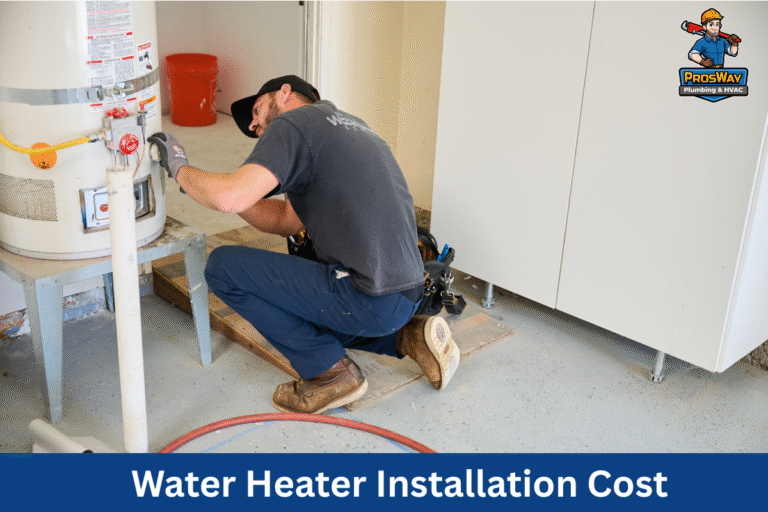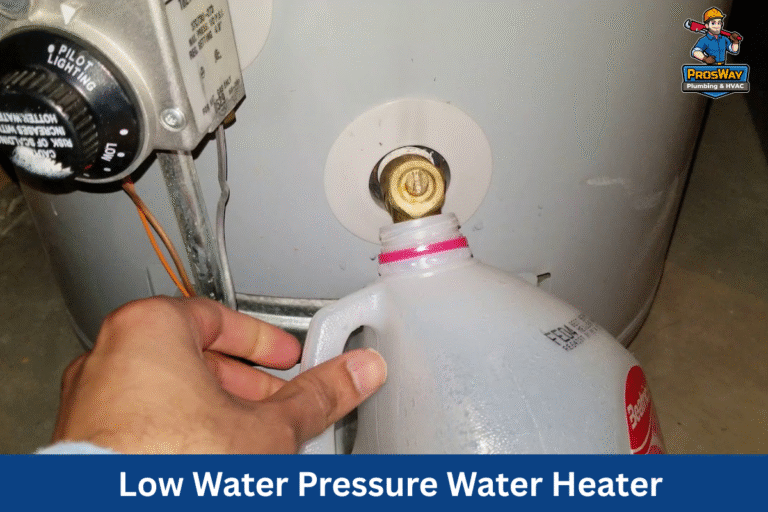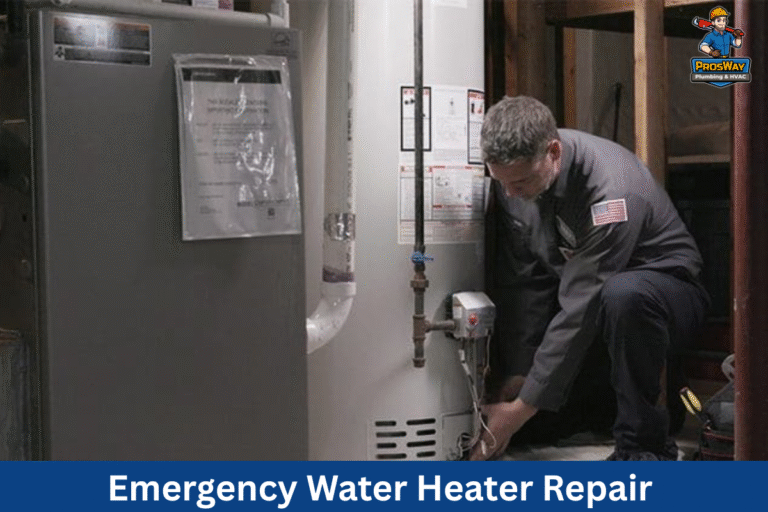Clogged drains are a common issue many homeowners face, often leading to frustration and inconvenience. When should you tackle these problems yourself, and when is it time to call in a professional?
This guide will explore when to DIY and when to call a pro, key signs that you may need expert assistance, effective DIY solutions for minor clogs, and the risks of ignoring drainage issues.
At ProsWay Plumbing & HVAC, we specialize in drain cleaning and clogged drain solutions for homeowners in Parsippany and North Jersey.
Key Takeaways
- Recognizing warning signs like persistent clogs helps prevent more severe plumbing issues
- Homeowners should seek professional help when DIY methods fail to resolve drainage problems
- Unusual sounds from pipes may indicate deeper plumbing issues that require expert attention
- Neglecting clogged drains can lead to serious health hazards and costly repairs over time
- Regular maintenance and mindful usage of drains are key to preventing future clogs
When Should You Seek Professional Help for Clogged Drains?

When dealing with clogged drains, certain signs indicate that it is time to seek professional assistance. Persistent issues despite DIY efforts can mean deeper complications within the plumbing system.
Unusual sounds coming from pipes, water backing up in multiple fixtures like the bathtub, and foul odors suggesting issues with the main sewer or drainage system are all critical signals.
Recognizing these warning signs helps homeowners take the right steps before problems worsen.
Why Are DIY Efforts Not Working?
When a clogged drain in Parsippany persists despite multiple attempts to unclog it with DIY methods, it may indicate a more serious underlying issue.
Homeowners often resort to using drain cleaners or boiling water in their tanks to clear blockages, but these solutions can sometimes be ineffective for a clogged drain Parsippany.
In such cases, it’s crucial to recognize that waiting longer can lead to more significant problems.
Making it smart to call in professionals who can accurately diagnose and resolve the clogged drain Parsippany situation safely and effectively.
Unusual Sounds Coming From Pipes
Unusual sounds coming from pipes can indicate problems beyond simple clogging in sinks or drains.
For instance, gurgling noises may suggest that air is trapped in the sewer line due to a blockage while tapping or banging sounds could point to shifting pipes or pressure changes.
Addressing these issues promptly is essential, as they can lead to more severe complications and carbon buildup that might pose health risks.
Making it wise to consult professionals for a thorough inspection and remediation of clogged drains.
Water Backing Up in Multiple Fixtures
When water begins backing up in multiple fixtures, it often signals a significant issue within the sewer system.
This could indicate a blockage that a standard plunger or even the best drain cleaners are unable to address, potentially resulting in flooding in the home.
Homeowners are encouraged to avoid DIY solutions like vinegar and baking soda in these cases and instead contact professionals who can accurately diagnose the issue and implement effective remedies.
What Do Foul Odors From Drains Mean?
Foul odors emerging from drains often indicate the presence of sewer gases, which can be a serious issue.
These unpleasant smells may suggest a buildup of bacteria or a malfunctioning septic tank that requires immediate attention.
Homeowners noticing such odors should prioritize professional drain cleaning, as ignoring the issue could lead to more significant health risks and costly repairs.
Sometimes, a simple clog can be fixed without calling for help. Let’s explore some effective DIY solutions to tackle those minor drain problems before they grow into bigger issues.
What Are the Best DIY Solutions for Minor Clogs?
Common household tools can effectively tackle minor clogs found in bathrooms or basements.
Homeowners can use effective homemade drain cleaning solutions to eliminate debris. A step-by-step guide for clearing simple blockages will provide clear instructions.
Finally, understanding when to stop DIY efforts and call a professional can prevent leaks and more serious plumbing issues.
Which Household Tools Work Best for Minor Clogs?
Common household tools can be very effective for tackling minor clogs in sinks and drains. Top tools like a plunger, especially those with a flange designed for porcelain fixtures, can help dislodge small blockages.
For more stubborn clogs, utilizing a plumbing snake or auger can reach deep into the pipes, providing a solution before needing to consider professional drain cleaning services.
| Tool | Usage |
|---|---|
| Plunger | Ideal for simple blockages in sinks or toilets. |
| Plumbing Snake | Effective for deeper clogs beyond the reach of a plunger. |
| Drain Cleaning Solution | Use for minor buildup in pipes; avoid harsh chemicals. |
How Can You Make an Effective Homemade Drain Cleaner?
Effective homemade drain cleaning solutions can provide relief for minor clogs in household plumbing, especially in the case of toilet clogs.
For instance, a mixture of baking soda and vinegar can help break down debris in pipes or toilet traps, potentially reducing the risk of developing issues such as sewage backups or sewer gas odors.
Homeowners should consider these methods as a first response, but if problems persist, consulting professionals will ensure that deeper issues are addressed safely and effectively.
Check out this video for additional insights to Unclog a Drain and Kitchen Sink:
Step-by-Step Guide for Clearing Simple Blockages
To effectively clear simple blockages in drains, homeowners can begin by using a vacuum designed for wet and dry use to remove debris and excess wastewater from the affected area.
Next, pouring hot soapy water down the drain can help break down grease or any residual buildup, such as soap and toilet paper.
If this does not resolve the issue, using a plumbing snake can further dislodge stubborn clogs, providing a reliable solution before considering the need for professional assistance.
When to Stop DIY Efforts and Call a Professional?
Homeowners should stop their DIY efforts and consult a professional when clogged toilets or drains persist despite multiple attempts with tools like a toilet snake or the use of chemical drain cleaners.
If homeowners notice unusual odors, such as carbon dioxide from sewer gases, or if they find that their tools, including wires used for cleaning, are ineffective in clearing blockages, it is a clear indication of a more serious issue within the plumbing system.
Seeking expert assistance at this stage ensures that the problem is accurately diagnosed and resolved, preventing potential health risks and costly repairs down the line.
Ignoring a clogged drain may seem harmless at first, but beneath the surface lies a looming threat.
A small problem can quickly turn into a larger mess, demanding attention before it spirals out of control.
Why Should You Avoid Ignoring Clogged Drains?
Ignoring clogged drains can lead to significant risks, including potential health hazards from stagnant water that breeds bacteria.
Additionally, homeowners may face structural damage to their plumbing system if ongoing issues remain unaddressed.
Delaying professional intervention often results in increased costs, making it vital to recognize these dangers and act promptly.
The Health Risks of Stagnant Water?
Stagnant water can pose serious health hazards due to the potential growth of harmful bacteria and mold.
Over time, this buildup can lead to unpleasant odors and may attract pests, thus creating an unsanitary environment in the home.
Homeowners should prioritize addressing clogged drains quickly, as ignoring these issues can result in both health risks and costly repairs requiring professional intervention.
Structural Damage to Your Plumbing System
Ignoring clogged drains can lead to serious structural damage to the plumbing system. When water cannot flow freely due to blockages, it can create excessive pressure within pipes, causing them to crack or burst.
This not only leads to costly repairs but can also damage surrounding areas, creating a ripple effect of issues that homeowners must address promptly to maintain the integrity of their plumbing system:
- Cracks and leaks in pipes
- Water damage to flooring and walls
- Higher repair costs over time
How Can Delaying Professional Help Increase Costs?
Delaying professional intervention for clogged drains can lead to significantly increased drain cleaning costs for homeowners.
When blockages remain untreated, they can escalate, resulting in more extensive damage to the plumbing system, such as pipe bursts or severe leaks.
Engaging a qualified expert early on not only addresses the immediate issue but also minimizes the risk of expensive repairs down the line, ultimately protecting investment in the home’s plumbing infrastructure.
Ignoring a clogged drain brings trouble that often lingers. It’s time to weigh the choice between handling it yourself or calling in the experts for help.
When Should You Choose DIY vs. Professional Services?

Understanding the options between DIY methods and professional services for clogged drains is vital for homeowners.
This section examines the cost analysis of DIY techniques compared to hiring a plumber, the time investment required for different clogging scenarios, and the long-term effectiveness of professional repairs.
Each aspect offers practical insights, helping homeowners decide the best approach for their specific needs.
What Are the Cost Differences Between DIY and Professional Drain Services?
When evaluating the cost analysis of DIY methods versus hiring a plumber for clogged drains, homeowners must consider both immediate and long-term expenses.
DIY solutions often require minimal financial investment, utilizing household tools or inexpensive drain cleaners; however, ineffective attempts can lead to higher costs if professional services become necessary later.
In contrast, while hiring a plumber typically incurs higher upfront costs, their expertise ensures a thorough diagnosis and effective resolution of the issue.
Potentially saving homeowners money on future repairs and preventing further damage to the plumbing system.
- DIY methods may seem cost-effective but could lead to higher expenses if issues worsen.
- Professional services offer immediate solutions, reducing the risk of future problems and costs.
- Choosing the right approach depends on the severity of the clog and its potential consequences.
Time Investment for Various Clogging Scenarios
Time investment for addressing clogged drains varies considerably between DIY attempts and professional services.
Minor clogs, such as those in sinks or tubs, may only require a brief period for homeowners to use a plunger or plumbing snake, often taking less than an hour.
However, more complicated issues, like blockages deep within the plumbing system, can lead to longer repair times if handled by an inexperienced person.
Whereas qualified professionals can accurately diagnose and fix the problem efficiently, typically completing the task within a couple of hours:
| Clogging Scenario | DIY Time Investment | Professional Time Investment |
|---|---|---|
| Minor sink or tub clog | 30 minutes to 1 hour | N/A |
| Stubborn drain blockage | 1 to 2 hours | 1 to 2 hours |
| Deep plumbing issues | 2+ hours (possible ongoing issues) | 1 to 3 hours |
Long-Term Effectiveness of Professional Repairs
Professional repairs for clogged drains offer long-term effectiveness that DIY methods often cannot match.
Skilled plumbers possess the necessary expertise and tools to accurately diagnose the issue and resolve underlying problems, ensuring the plumbing system functions smoothly for years to come.
By opting for professional assistance, homeowners not only address immediate concerns but also minimize the potential for recurring clogs, ultimately saving time and money in the long run.
You’ve weighed the pros and cons of tackling a clogged drain yourself versus calling in help.
What Are the Key Factors to Consider Before Calling a Plumber?

Assessing the severity of the clog is essential, as it directly impacts daily life and may require immediate professional intervention.
Homeowners should also consider the age and condition of their plumbing infrastructure, as older systems can complicate repairs.
Additionally, understanding the availability of other plumbing services can guide decisions, ensuring all related needs are addressed effectively.
How Severe Is the Clog and How Does It Impact Daily Life?
The severity of a clog can significantly affect daily life, making it essential for homeowners to assess the situation carefully.
Minor clogs may only cause inconvenience, but more severe blockages can disrupt water flow entirely, impacting activities such as cooking and bathing.
Recognizing how a clog affects daily routines helps homeowners determine whether a DIY approach is sufficient or if contacting a professional plumber is the best course of action:
- Minor clogs can often be managed with home remedies.
- Severe blockages might require immediate attention to prevent extensive water damage.
- Assessing the impact on daily life helps prioritize solutions effectively.
Age and Condition of Plumbing Infrastructure
The age and condition of plumbing infrastructure are crucial factors that homeowners must consider when evaluating whether to tackle a clogged drain themselves or call in professionals.
Older plumbing systems may be more prone to wear and damage, making it vital to assess their overall integrity.
Rust and deterioration can cause persistent clogs that require professional pipe repair or repiping.
If plumbing systems are outdated, simple clog removal may not be enough, and upgrading to newer, more durable materials might be the best solution.
What Additional Plumbing Services Should You Consider?
When considering whether to call a plumber, homeowners should evaluate the availability of additional plumbing services.
Plumbing issues can often be interconnected, and having a professional who can address various needs such as toilet repairs, water heater maintenance, or pipe inspections can provide comprehensive solutions, saving time and potential hassle.
A qualified plumber can also suggest preventive measures to avoid future clogs, ensuring the longevity of the home’s plumbing system.
| Scenario | Service Needed | Importance of Professional Help |
|---|---|---|
| Clogged drain | Drain cleaning | Removes blockages effectively to prevent further issues |
| Unusual sounds from pipes | Pipe inspection | Identifies underlying problems requiring expert attention |
| Frequent backups | Comprehensive plumbing assessment | Helps detect systemic issues and offers long-term solutions |
Frequently Asked Questions (FAQs)
How Can You Choose the Right Plumber for Your Needs?
Choosing the right plumber for clogged drains involves considering qualifications, experience, and customer reviews.
Homeowners should look for licensed professionals with a solid track record in addressing similar issues, such as those seen in residential plumbing.
Researching local plumbing services, seeking recommendations, and reading reviews can provide valuable insights, ensuring that the chosen expert delivers effective solutions to restore proper drain function.
What Should You Expect From a Professional Drain Service?
When homeowners engage in a professional drain service, they can expect a comprehensive assessment of the plumbing situation.
Experienced plumbers will utilize advanced tools and techniques to identify the cause of the blockage, ensuring a thorough and effective resolution.
Clients can also anticipate clear communication regarding the process, pricing, and any necessary follow-up actions to maintain the health of their plumbing system, leaving them confident in the solutions provided.
How Can You Prevent Future Clogs After Professional Service?
To prevent future clogs after professional service, homeowners should focus on regular maintenance and mindful usage of drains.
Simple practices like using drain guards to catch debris, avoiding the disposal of grease down the sink, and flushing drains with hot water periodically can significantly reduce buildup.
Staying vigilant about what goes into the plumbing system helps maintain smooth operation and minimizes the risk of recurring issues, allowing homeowners to enjoy hassle-free plumbing.
Conclusion
A thorough knowledge of when to DIY and when to call a pro for clogged drains is crucial for maintaining a healthy plumbing system. Homeowners should recognize warning signs like persistent issues, unusual sounds, and foul odors, which indicate a need for expert intervention. While DIY methods can effectively manage minor clogs, ignoring deeper problems can lead to significant health risks and costly repairs.
Need Professional Drain Cleaning? Call ProsWay Today!
Don’t let a clogged drain turn into a major plumbing disaster! At ProsWay Plumbing & HVAC, we offer fast, reliable, and expert drain services to keep your home’s plumbing system running smoothly. Call us now at (862) 260-5870 or Book Online for same-day service!








